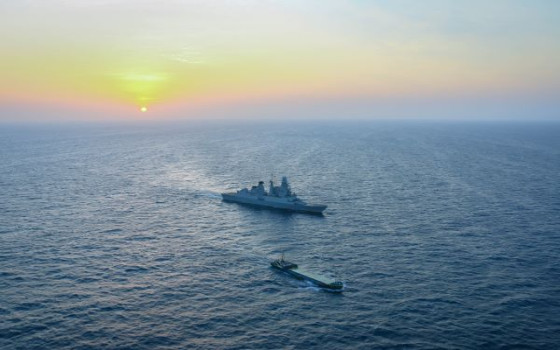
The European Union: Updating the strategy to protect the maritime domain from new threats

- Europe and Arabs
- Sunday , 12 March 2023 16:29 PM GMT
Brussels: Europe and the Arabs
The European Commission and the High Coordinator for Foreign and Security Policies adopted a joint statement on an enhanced maritime security strategy for the European Union to ensure the peaceful use of the seas and protect maritime space from new threats. They also adopted an updated action plan through which the strategy will be implemented.
Maritime security is vital to the European Union and its Member States. Together, the member states of the European Union form the largest joint exclusive economic area in the world. The EU economy is highly dependent on safe and secure surroundings. More than 80% of world trade is transported by sea, and nearly two-thirds of the world's oil and gas is extracted at sea or transported by sea. Up to 99% of global data flows are transmitted over undersea cables. The global maritime domain must be secure to unlock the full potential of the oceans and a sustainable blue economy. The European Union intends to enhance the broad range of tools at its disposal to enhance maritime security, both civil and military.
Adapting to new threats
Security threats and challenges have multiplied since the adoption of the EU Maritime Security Strategy in 2014, requiring new and enhanced measures. Longstanding illicit activities such as piracy and armed robbery at sea, smuggling of migrants, human, arms and drug trafficking, as well as terrorism continue to pose serious challenges. But new and evolving threats must also be dealt with with increasing geopolitical competition, climate change, degradation of the marine environment, and hybrid and cyber attacks.
This is an opportunity to drive forward sustainable solutions to the multiple maritime security issues faced by the European Union and the international community. It is also an opportunity to enhance the role and credibility of the European Union in the international arena. Recent geopolitical developments, such as Russia's military aggression against Ukraine, are a stark reminder that the EU needs to strengthen its security and increase its ability to operate not only on its own territory and waters, but also in its neighborhood and beyond.
Updated European Maritime Security Strategy (EUMSS)
The updated EUMSS is a framework for the European Union to take action to protect its interests at sea and protect its citizens, values and economy.
The updated Maritime Security Strategy promotes international peace and security, as well as respect for international rules and principles, while ensuring ocean sustainability and biodiversity protection. The strategy will be implemented by the EU and its Member States, in line with their respective mandates.
The joint contacts and the associated Action Plan define several complementary actions that will advance the interests of the European Union. To do this, the EU will intensify its action in accordance with six strategic objectives:
Increased activities at sea. The measures include the organization of EU-wide naval exercises, the further development of coast guard operations in European sea basins, the identification of new sea areas of interest for the implementation of the concept of a coordinated maritime presence (a tool to enhance coordination between the naval and air assets of member states in specific maritime areas) and the strengthening of Security checks at EU ports.
Cooperation with partners. The measures include deepening cooperation between the EU and NATO and stepping up cooperation with all relevant international partners in support of the rules-based order at sea, in particular the United Nations Convention on the Law of the Sea.
Maritime Awareness Command. Measures include enhancing monitoring of coastal and offshore patrol vessels and enhancing the Common Information Exchange Environment (CISE). This is to ensure that the relevant national and EU authorities can exchange information in a secure manner.
Risk and Threat Management. Actions include conducting regular live maritime exercises involving civilian and military actors, monitoring and protecting critical maritime infrastructure and ships (including passenger vessels) from physical and electronic threats, and handling unexploded ordnance and mines at sea.
Capacity enhancement. Actions include developing common requirements for defense technologies in the maritime domain, stepping up work on projects such as the European Patrol Corvette (a new class of warship), and improving our anti-submarine capabilities.
Education and training by promoting hybrid and cyber security qualifications in particular on the civilian side and conducting training programs open to non-EU partners.
The updated Strategy and Action Plan will contribute to the implementation of the EU's Strategic Compass for Security and Defense.
The Commission and the High Coordinator for Policy invite member states to endorse and implement the strategy on their part. The Commission and the High Representative will issue a progress report within three years after the endorsement of the updated strategy by the Council of the European Union.
The EU Maritime Security Strategy and Action Plan has been in place since 2014. The action plan was last updated in 2018. The proposed update follows on from the Council’s June 2021 Maritime Security Conclusions, which called on the Commission and the High Representative to assess the need for this update.
Since 2014, the EUMSS and Action Plan have provided a comprehensive framework for deterring and responding to security challenges at sea. It has stimulated closer cooperation between the civil and military authorities, particularly through the exchange of information. EUMSS has helped promote rules-based governance at sea and develop international cooperation in the maritime domain. It has strengthened the EU's independence and its ability to respond to maritime security threats and challenges. The European Union has become a recognized player in the field of maritime security It operates its own maritime operations, promotes awareness of the maritime field and cooperates with a wide range of external partners.












No Comments Found